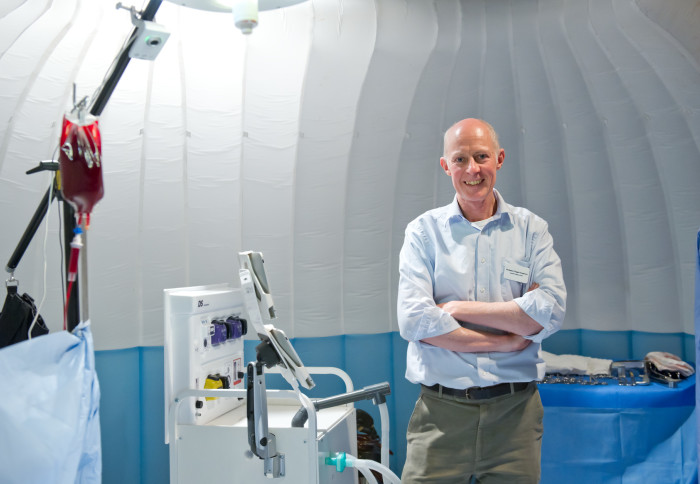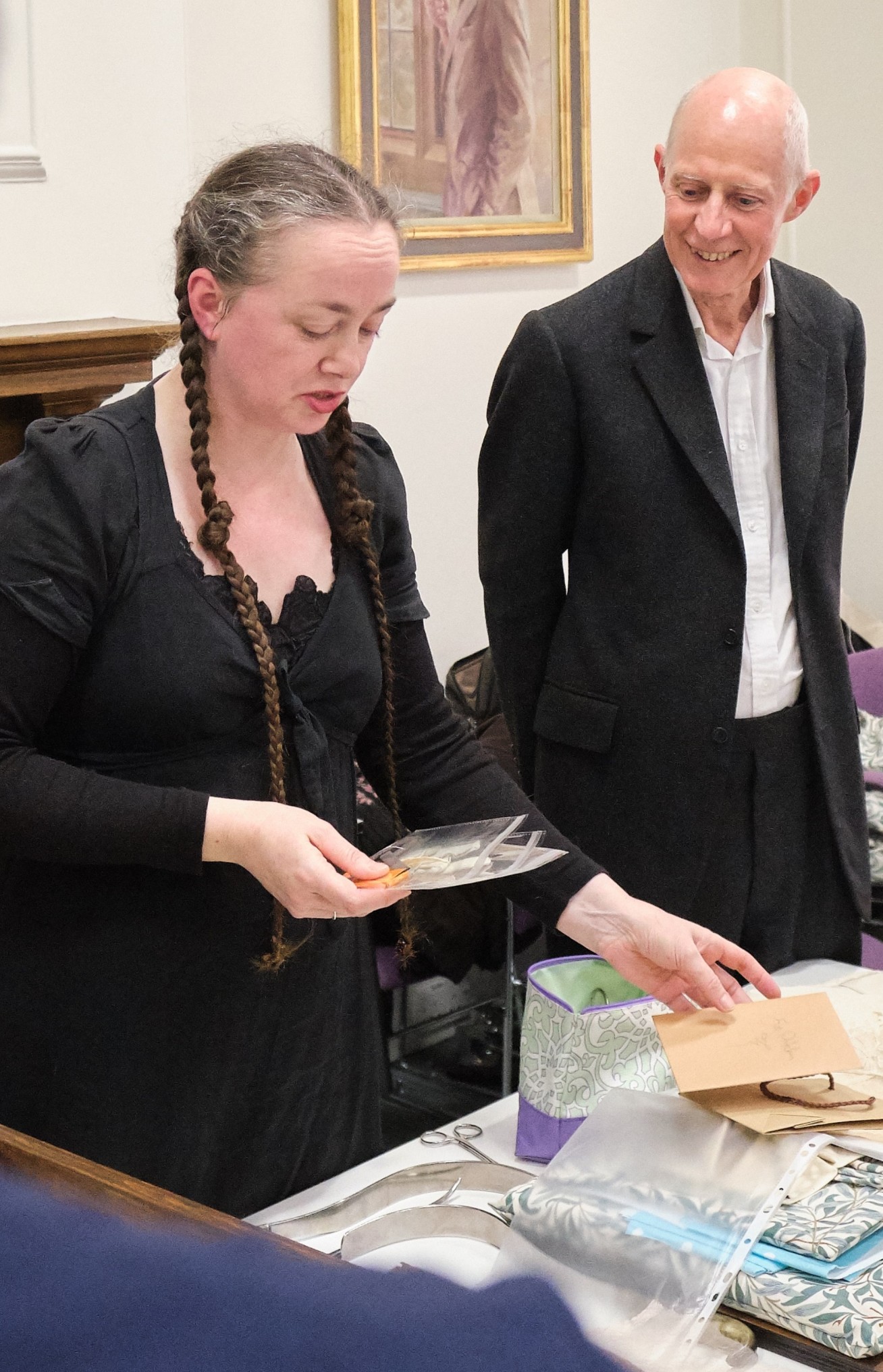
Professor Roger Kneebone in a pop-up operating theatre
Global S&T Development Trend Analysis Platform of Resources and Environment
| Roger Kneebone on the path to expertise and why experts matter | |
| admin | |
| 2020-08-27 | |
| 发布年 | 2020 |
| 语种 | 英语 |
| 国家 | 英国 |
| 领域 | 资源环境 |
| 正文(英文) | 
Professor Roger Kneebone in a pop-up operating theatre 
A leading Imperial academic shows us the importance and relevance of the journey towards expertise in a groundbreaking new book. In his first book, Expert, Professor Roger Kneebone talks about the importance of expertise, the journey it involves, and why a plasterer can have just as much of it as a fighter pilot.
In our post-Brexit, pandemic-gripped world where some have claimed there are ‘too many experts’, Professor Kneebone draws out important messages, using new research and insights along the way. We spoke to Professor Kneebone about why he wrote his first book and why the subject matter is so close to his heart. Why did you want to write a book about experts?When I started I realised that everything I’d read previously were external accounts about expertise and what it consists of, but what really interested me was the inside story of what it means to become expert. In my view there are two kinds. There are experts like surgeons, builders, airline pilots – people who can do things we can’t do ourselves when we need them. The other kind is all of us. We are all on a path to becoming expert, whether it’s a job or evening classes. Becoming expert is making the best use of the potential we all have, which is a basic human need, and human right. And I see it as a kind of path, a sequence or progression. So it’s about tracking what happens from when you go from knowing nothing, to becoming independent, to then passing your knowledge on, how you deal with errors and mistakes, and then how you shift your focus from it being about you to being about other people. The idea of tracking that process in the book was to make it clear what I think those conditions are, what becoming an expert requires. So is there a lack of understanding about expertise and experts?They are certainly getting a bad press. The whole way in which we see experts in society is really problematic and needs to be put right. For a long time, experts have had respect for the work they do chiselled away in a sort of unremitting micro-scrutiny. People have focused on the individual things that they do without acknowledging the broader expertise and wisdom that they have developed over years and decades. We are damaging the respect and value we get from experts as a group. And of course as a group they are not homogeneous. Some of them are better than others, and some of them can be manipulative or dishonest, because of course they are all human. But that’s not a reason for not acknowledging, respecting and valuing what experts mean in our society. This mistrust of experts been unfolding even more in the current crisis and we are now in danger of either not knowing about it and recognising it, or poisoning the well and not looking after the experts we have. It’s all about how we regard experts in our society and how we take advantage of, nourish and support that enormous resource of wisdom and skill, represented by our experts. If we don’t do that, and using a medical metaphor, we are kind of standing on our own air hose. What do you think the main findings of the book are, the key messages?
A lot of it is about risk and becoming expert is all about learning to live and manage risk and gradually doing more risky things, since you are doing more things yourself and living with the consequences without people to protect you. As an expert you also become more skilled at seeing risk coming towards you and avoiding it. It certainly makes you grow up and you have to find out yourself how to navigate that. The other thing I would say is you can’t become expert unless you take a long time. You need time for things to go wrong and learn to put them right. You have to have been in difficult situations, and learn from that experience. So it takes ages and it takes a lot of support from other people when you go through the bumpy bits. It takes perseverance and it takes both acknowledgement of your own skills as they’re developing, and humility. It never works by chance. People are experts because they have been at it 30 years. And that is hard for people to appreciate because part of being an expert and doing it for so long is to make it look effortless. So people then think “oh, anyone can do that.” It’s very easy to underestimate it. Who is the book for?A lot of people don’t think books about experts are for them because they don’t feel expert, but actually everybody is on a path to getting better at whatever it is they’re interested in doing. There is never a point at which you become expert, before which you were absolutely not, and after which you indisputably are. It’s a continuum. Some of the very most expert people I have spoken to said to me: “Well of course I’m not an expert. I’ve been doing this for 40 years but…” Nobody will ever be as good as they could possibly become. That’s one of the exciting things about it because you can always keep getting better. Are you now writing your second book?I would like to write another book. It was a very absorbing experience, and quite difficult, but I really enjoyed it and I like a challenge anyway, especially the challenge of trying to put complex ideas into simple language. I find that particularly exciting. And I do have a low boredom threshold.
|
| URL | 查看原文 |
| 来源平台 | Imperial College London |
| 文献类型 | 新闻 |
| 条目标识符 | http://119.78.100.173/C666/handle/2XK7JSWQ/291868 |
| 专题 | 资源环境科学 |
| 推荐引用方式 GB/T 7714 | admin. Roger Kneebone on the path to expertise and why experts matter. 2020. |
| 条目包含的文件 | 条目无相关文件。 | |||||
| 个性服务 |
| 推荐该条目 |
| 保存到收藏夹 |
| 查看访问统计 |
| 导出为Endnote文件 |
| 谷歌学术 |
| 谷歌学术中相似的文章 |
| [admin]的文章 |
| 百度学术 |
| 百度学术中相似的文章 |
| [admin]的文章 |
| 必应学术 |
| 必应学术中相似的文章 |
| [admin]的文章 |
| 相关权益政策 |
| 暂无数据 |
| 收藏/分享 |
除非特别说明,本系统中所有内容都受版权保护,并保留所有权利。
修改评论